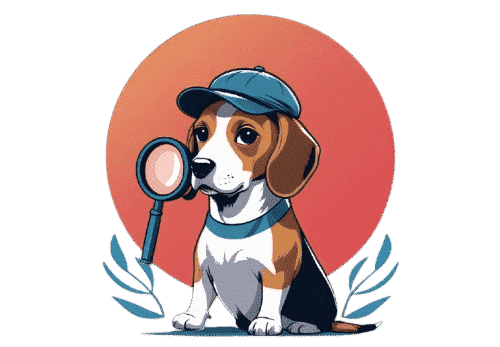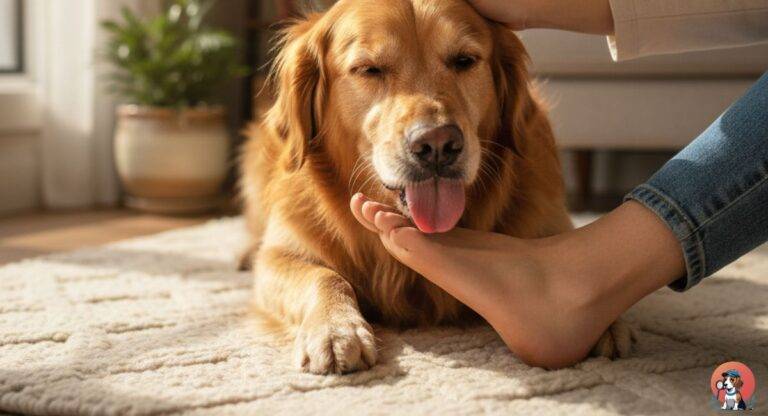Dogs licking paws is a behavior many owners notice but often underestimate. While some dogs do it as a simple grooming habit, frequent paw licking can indicate underlying issues like allergies, infections, or stress. Interestingly, it’s closely linked to dog licking feet, another habit that might seem affectionate but can also signal discomfort or irritation. By understanding why your dog engages in these behaviors, you can spot problems early, protect their paw health, and prevent painful infections. This guide dives into the surprising reasons behind paw licking and reveals practical tips for keeping your dog happy and healthy.
Dogs licking paws isn’t always about cleanliness—it can reveal hidden health and emotional concerns. Some dogs lick to soothe irritated skin or relieve mild discomfort, while others do it out of boredom or stress. Many owners also notice dog licking feet, a related behavior that shows their dog’s need for comfort or attention. Recognizing the signs that differentiate normal grooming from problematic licking is key to preventing paw injuries and infections. In this article, you’ll learn the most common causes of paw licking, how it links to foot-licking habits, and actionable ways to keep your furry friend safe and comfortable.
Dogs licking paws may seem like a harmless habit, but it often signals much more than routine cleaning. From seasonal allergies and yeast infections to anxiety and stress, paw licking can affect your dog’s comfort and well-being. What’s fascinating is how this behavior often appears alongside dog licking feet, revealing patterns that owners might miss. By paying attention to these habits, you can identify health problems early, improve hygiene, and strengthen your bond with your dog. This guide explores the causes, warning signs, and solutions, offering every dog parent practical advice to keep their pet healthy, happy, and itch-free.
1. Why dogs licking paws
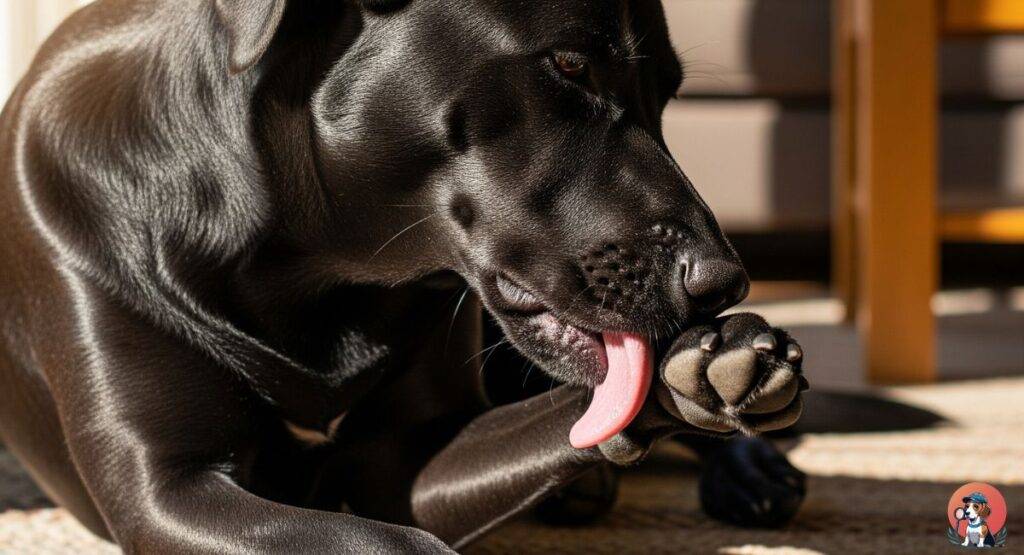 Dogs licking paws can be a simple grooming habit or a sign of underlying medical or behavioral issues. While occasional licking is normal, persistent licking may indicate irritation, allergies, or stress. Dogs may lick to clean dirt, mud, or grass, soothe itchy skin, relieve dryness, react to allergens, manage flea or tick bites, or cope with pain and anxiety. Understanding these behaviors helps prevent infections and ensures paw health. It can also relate to dog licking fee, where pets show affection or discomfort. Early observation allows owners to address problems and keep their dogs happy and comfortable.
Dogs licking paws can be a simple grooming habit or a sign of underlying medical or behavioral issues. While occasional licking is normal, persistent licking may indicate irritation, allergies, or stress. Dogs may lick to clean dirt, mud, or grass, soothe itchy skin, relieve dryness, react to allergens, manage flea or tick bites, or cope with pain and anxiety. Understanding these behaviors helps prevent infections and ensures paw health. It can also relate to dog licking fee, where pets show affection or discomfort. Early observation allows owners to address problems and keep their dogs happy and comfortable.Common Reasons Dogs Lick Their Paws
-
Natural grooming after meals or walks
-
Cleaning dirt, mud, or grass between toes
-
Soothing mild irritation or itchiness
-
Relieving dry or cracked paw pads
-
Reaction to pollen dust or other allergens
-
Flea or tick bites are causing discomfort
-
Developing habits out of boredom
-
Anxiety or stress relief
-
Pain from hidden injuries
-
The early stages of infection are forming
2. Normal vs Excessive Paw Licking
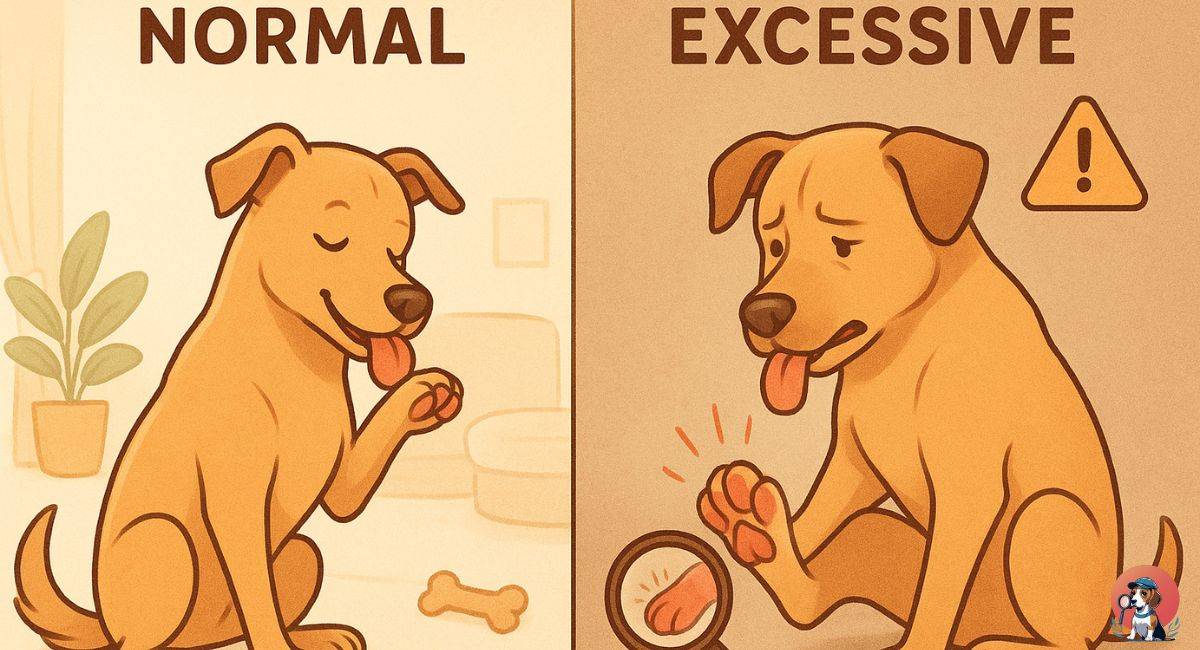 Distinguishing normal from excessive dog licking of paws is essential. Normal licking keeps paws clean, while constant licking can cause redness, swelling, and infections. Excessive licking may indicate pain or behavioral issues. It often accompanies dog licking feet, showing emotional distress or discomfort. Observing patterns of licking throughout the day helps identify problems. Owners can intervene early to prevent chronic issues and improve comfort. Recognizing when paw licking crosses the line allows timely action, ensuring your dog’s paws remain healthy and pain-free.
Distinguishing normal from excessive dog licking of paws is essential. Normal licking keeps paws clean, while constant licking can cause redness, swelling, and infections. Excessive licking may indicate pain or behavioral issues. It often accompanies dog licking feet, showing emotional distress or discomfort. Observing patterns of licking throughout the day helps identify problems. Owners can intervene early to prevent chronic issues and improve comfort. Recognizing when paw licking crosses the line allows timely action, ensuring your dog’s paws remain healthy and pain-free.
Signs Licking Has Become Excessive
-
Constant chewing and licking throughout the day
-
Red or swollen paw pads
-
Fur loss between toes
-
Cracked or bleeding skin
-
Brown staining from saliva
-
Persistent foul odor
-
Restlessness caused by irritation
-
Limping or avoiding pressure on paws
-
Repeated licking at night
-
Discomfort while walking or running
3. Allergies and Dog Paw Licking
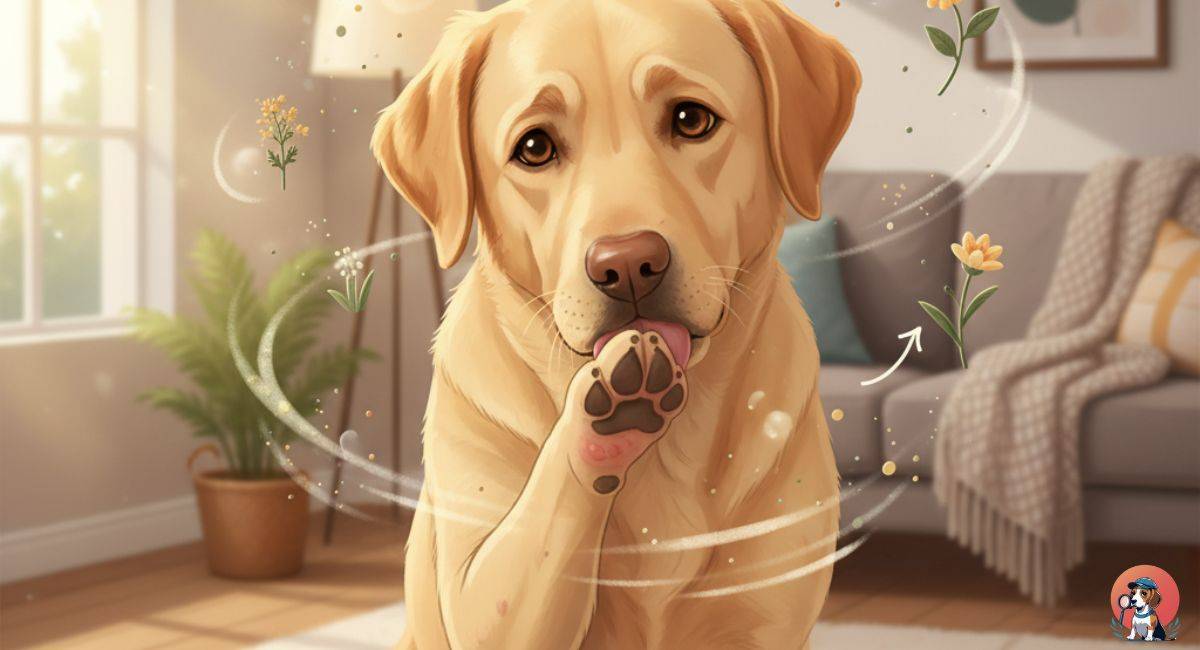 Allergies are a common reason for dogs licking paws. Dogs may react to foods, environmental factors, or chemicals in the home. Licking helps soothe irritation caused by allergens. This behavior often appears alongside dog licking feet. Seasonal pollen, dust mite, mold, fertilizers, cleaning products, perfumed shampoo, flea bites, certain foods, synthetic fabrics, and smoke can all trigger paw licking. Recognizing and managing these triggers through diet cleaning routines and preventive measures reduces discomfort and promotes paw health. Understanding allergy triggers helps owners keep dogs comfortable and reduces excessive licking.
Allergies are a common reason for dogs licking paws. Dogs may react to foods, environmental factors, or chemicals in the home. Licking helps soothe irritation caused by allergens. This behavior often appears alongside dog licking feet. Seasonal pollen, dust mite, mold, fertilizers, cleaning products, perfumed shampoo, flea bites, certain foods, synthetic fabrics, and smoke can all trigger paw licking. Recognizing and managing these triggers through diet cleaning routines and preventive measures reduces discomfort and promotes paw health. Understanding allergy triggers helps owners keep dogs comfortable and reduces excessive licking.
Common Allergy Triggers
-
Seasonal pollen during spring and summer
-
Dust mites in carpets and bedding
-
Mold spores in damp areas
-
Grass and outdoor fertilizers
-
Household cleaning sprays or soaps
-
Perfumed shampoos or sprays
-
Flea bites and saliva
-
Certain dog food ingredients like chicken, beef, or wheat
-
Synthetic fabrics in blankets or toys
-
Smoke or air pollution
4. Infections and Yeast Problems in Paws
Persistent dogs licking paws with odor discharge or redness may indicate bacterial or yeast infections. Moisture from licking worsens infections, leading to discomfort, hair loss, or thickened skin. Infections may also cause your dog to lick its feet as part of the behavior. Early identification prevents chronic problems and ensures comfort. Timely veterinary care, along with cleaning and treatment, resolves infections and restores paw health. Dogs licking paws, addressing these issues reduces pain and prevents recurring infections, helping your dog walk and play comfortably.
Signs of Paw Infections
-
Foul, musty odor from paws
-
Redness or swelling between toes
-
Thick, greasy skin around nails
-
Discharge or pus-like fluid
-
Crusty skin forming on paw pads
-
Repeated licking with whimpering sounds
-
Hair loss in paw areas
-
Difficulty walking or limping
-
Skin appearing shiny or oily
-
Infections returning frequently
5. Anxiety and Stress-Related Licking
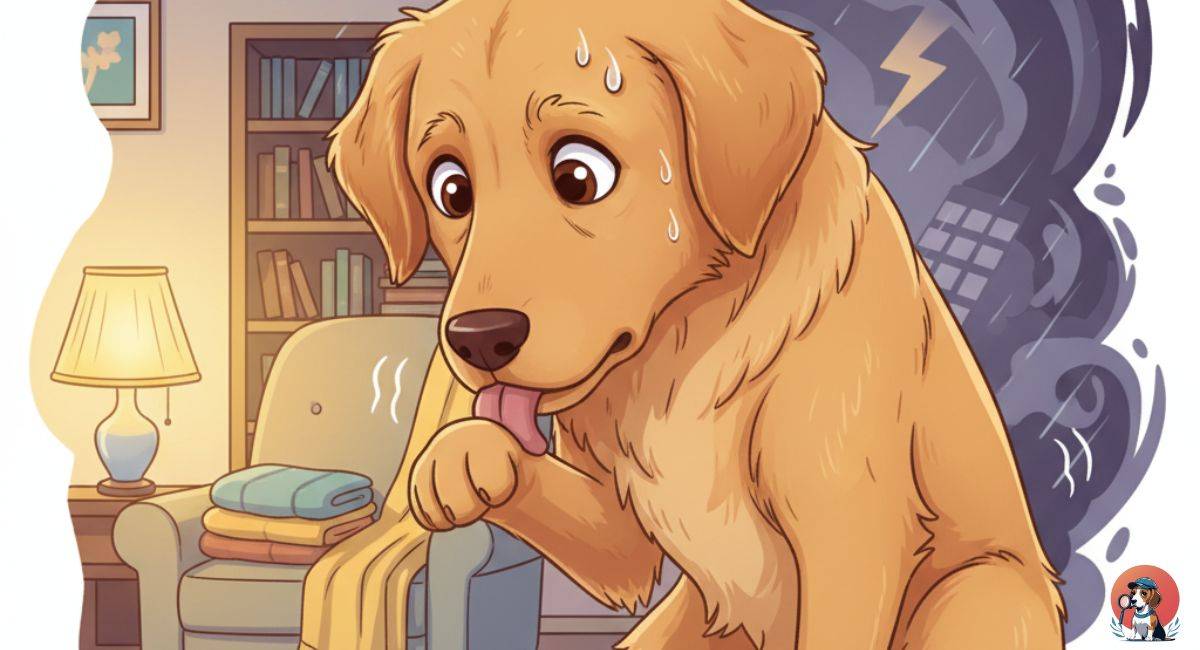 Emotional factors often drive dogs to lick their paws. Dogs use licking to relieve anxiety or boredom and may also lick feet as a comfort habit. Recognizing triggers can reduce licking and improve mental health. Common triggers include separation from owners, loud noise, travel routine changes, loss of companion pets, or introduction of new pets. Lack of physical and mental stimulation can increase licking. Dogs licking paws, Providing exercise, attention, and interactive toys helps manage stress and prevents obsessive licking behaviors, maintaining both emotional and paw health.
Emotional factors often drive dogs to lick their paws. Dogs use licking to relieve anxiety or boredom and may also lick feet as a comfort habit. Recognizing triggers can reduce licking and improve mental health. Common triggers include separation from owners, loud noise, travel routine changes, loss of companion pets, or introduction of new pets. Lack of physical and mental stimulation can increase licking. Dogs licking paws, Providing exercise, attention, and interactive toys helps manage stress and prevents obsessive licking behaviors, maintaining both emotional and paw health.
Common Anxiety Triggers
-
Separation from owners
-
Loud noises like fireworks or thunderstorms
-
Traveling or car rides
-
Changes in daily routine
-
Loss of a companion pet
-
Being left alone for long hours
-
Owner stress transferring to the dog
-
Moving to a new home
-
Introduction of strangers or new pets
-
Lack of mental and physical stimulation
6. Home Remedies to Help Stop Paw Licking
Mild dogs licking paws can be managed at home with consistent care. Remedies soothe irritation, prevent dryness, and reduce licking behavior. Dogs may also lick their feet under stress. Home remedies include paw soaks, moisturizing gel, and calming treatment. Regular cleaning and protection improve paw health and reduce itching. Dogs licking paws, Implementing these methods consistently can prevent excessive licking and promote overall comfort, keeping paws healthy and preventing infections.
Best Home Remedies
-
Epsom salt soaks to reduce inflammation
-
Coconut oil for moisturizing and healing
-
Aloe vera gel for soothing irritated skin
-
Oatmeal paste to relieve itching
-
Apple cider vinegar rinse diluted properly
-
Chamomile tea is soaked for its calming effect
-
Keeping paws clean and dry daily
-
Using paw balms for hydration
-
Switching to hypoallergenic food options
-
Regular grooming and trimming of paw hair
7. Veterinary Care for Persistent Licking
Sometimes, persistent dogs’ licking paws require professional treatment. Vets can identify infections, allergies, or deeper medical problems. Early intervention prevents chronic issues and reduces associated behaviors like dog licking feet. Treatments include medication, preventive care, or special therapies. Proper diagnosis ensures targeted relief and helps restore comfort. Timely veterinary care also prevents recurring infections, pain, and long-term paw damage, improving overall well-being.
Veterinary Treatments May Include
-
Prescription allergy medications
-
Antibiotics for bacterial infections
-
Antifungal treatments for yeast problems
-
Steroids to reduce inflammation
-
Flea and tick prevention
-
Pain relief for arthritis or injuries
-
Bandages to protect affected paws
-
Special medicated paw soaks
-
Dietary changes based on allergy testing
-
Laser therapy for chronic pain
8. Preventing Paw Licking in the Future
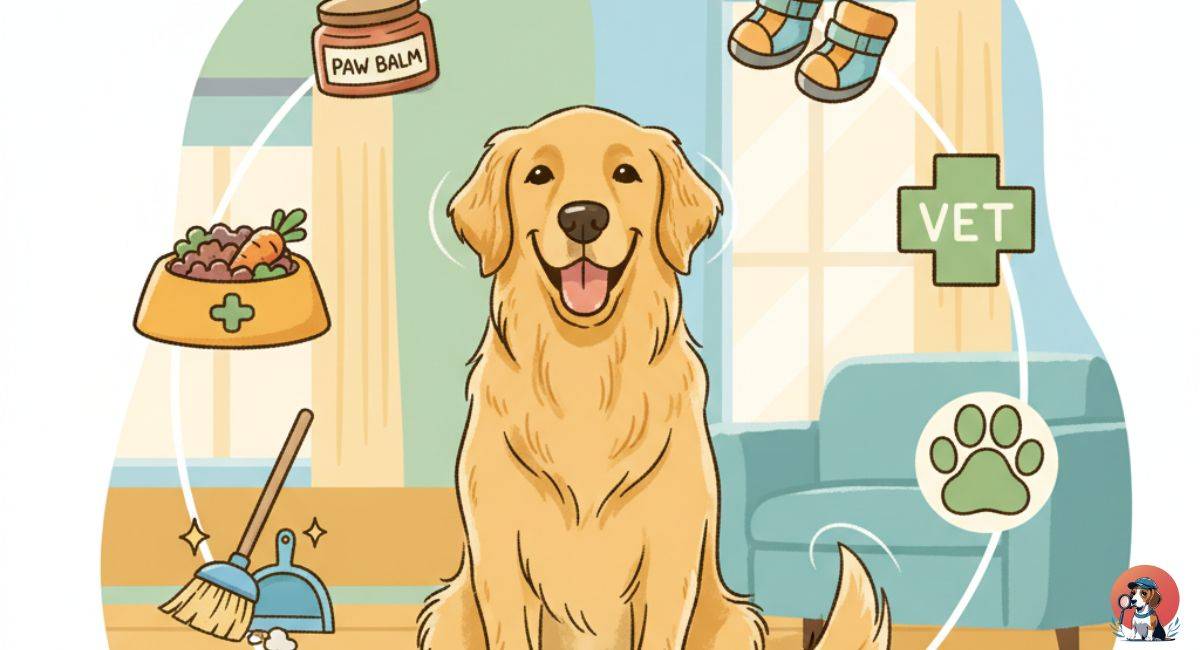 Preventing dogs from licking their paws protects paw health and comfort. Observing your dog and taking proactive steps reduces stress, irritation, and infection. Preventive measures also limit related behaviors such as dog licking feet. Regular cleaning, grooming, and nail trimming avoid harsh chemicals, provide exercise, mental stimulation, and a calm environment. Early detection of stress or irritation ensures dogs remain healthy, happy, and paw problems do not become chronic. Consistent preventive care supports long-term dogs licking paws and reduces excessive licking for both owner and pet.
Preventing dogs from licking their paws protects paw health and comfort. Observing your dog and taking proactive steps reduces stress, irritation, and infection. Preventive measures also limit related behaviors such as dog licking feet. Regular cleaning, grooming, and nail trimming avoid harsh chemicals, provide exercise, mental stimulation, and a calm environment. Early detection of stress or irritation ensures dogs remain healthy, happy, and paw problems do not become chronic. Consistent preventive care supports long-term dogs licking paws and reduces excessive licking for both owner and pet.
Prevention Tips
-
Cleaning paws after every walk
-
Avoiding harsh floor or lawn chemicals
-
Using paw balms to prevent dryness
-
Keeping nails short and well-trimmed
-
Providing daily exercise and playtime
-
Offering puzzle toys to reduce boredom
-
Feeding a balanced, allergy-safe diet
-
Scheduling regular vet visits
-
Monitoring stress or behavioral changes
-
Creating a calm, safe home environment
FAQs
Q1: Dogs licking paws at night – is it normal?
Frequent nighttime paw licking usually signals irritation, allergies, or stress. Occasional licking is harmless, but persistent licking can cause redness or infections. Dogs may also lick their dog licking feet for comfort in similar situations.
Q2: Can dogs licking paws spread germs?
Excessive licking can transfer bacteria or yeast to surfaces or humans. Cleaning paws regularly prevents contamination. Dogs may also lick their dog licking feet, which carries similar microbes.
Q3: Why do dogs lick paws after walks?
Dogs lick to remove dirt, mud, or allergens stuck between their toes. Persistent licking may indicate seasonal allergies or irritants. Some also lick their dog licking feet as part of grooming or comfort.
Q4: Do dogs lick paws out of boredom?
Boredom or lack of mental stimulation often causes paw licking. Interactive toys and exercise help redirect the habit. Dogs may also lick their dog licking feet when self-soothing.
Q5: How can I quickly stop my dog from licking paws?
Identify the cause, such as allergies, infections, or stress, to address it effectively. Remedies like paw soaks, booties, or moisturizers help reduce licking. Dogs may also lick their dog licking feet, so consistent care is essential.
Conclusion
Monitoring dogs licking paws is essential for every pet owner because it can indicate underlying health or behavioral issues. While occasional licking is normal, excessive paw licking may point to allergies, infections, or stress. Observing patterns helps identify the problem early and take preventive action. It also provides insight into related behaviors like dog licking feet, allowing owners to support both physical and emotional health. Timely intervention keeps your dog comfortable and reduces the risk of chronic paw problems.
Addressing dogs licking paws effectively involves combining preventive care, proper grooming, and attention to diet. Home remedies such as soothing paw balms, gentle paw soaks, and hydration can reduce dryness and irritation. Dogs may also lick their dog licking feet for comfort when anxious or bored, so ensuring mental and physical stimulation is essential. Dogs licking paws, Understanding these behaviors helps pet owners manage stress-related habits while promoting long-term paw and overall health for their furry companions.
Persistent dogs licking paws may require veterinary attention to treat infections, allergies, or underlying medical conditions. Professional evaluation ensures proper diagnosis and treatment, while consistent hygiene and preventive measures maintain paw health. Observing connections between paw licking and dog licking feet helps owners address both physical discomfort and emotional needs. Dogs licking paws, combining medical care, attentive home routines, and monitoring stress triggers, keep your dog safe, reduce excessive licking, and support long-term well-being and comfort.
